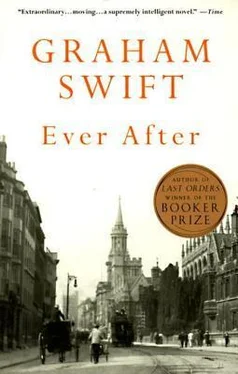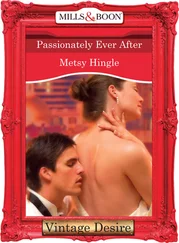What did it was the bees. The Rector’s innocent, Virgilian bees. It began with dinosaurs, but what brought things to the breaking point, to their final undoing, was the humble, humming bee.
You have to picture the scene. Matthew does not detail every moment of that June afternoon — though he makes it clear enough that this was the genuine, the irrevocable denouement. It seems that the Rector issued an ultimatum; and perhaps nothing less, in the end, would have satisfied Matthew. Perhaps the pitch of his conscience, so long attuned to its own dilemma, was such that it required and desired another’s pronouncement of judgement. Or, to put it another way, the Rector was part of Matthew by now: if he hadn’t existed, it would have been necessary for Matthew to invent him. You could say that when Matthew called at the Rectory that afternoon, he was only knocking at the door of his own soul. Except that that, of course, is the wrong way of putting it. Precisely the wrong way. What he was about to do was evict his soul from the premises, to send it packing. What he would have to say henceforth would be: My soul? My soul? I do not possess such a thing.
24th June 1860:
… and, amidst everything, I still ask myself, did I will it to have fallen out thus, or was the hand of chance still my final arbiter? If the latter, it would not be inappropriate; since I am committed now — oh, committed! — to a random universe, the seeming capacity of which to present to our eyes instances of omniscient purpose only deludes us. What I ask is: did I truly set out this afternoon — I cannot remember now my exact feelings, it seems such an age ago — prepared, by my own determination, to take upon myself the consequences which now, indeed, I must accept; or was this to have been, at worst, but another addition to our stretched chain of “disputations”? But then was not, increasingly, the very drift of those disputations towards precipitating, in the heat they generated, what I myself could not in cold blood initiate?
Cold blood! Is my blood cold? It rushes now round my veins with such animal tumult. Did I not, like some spiteful heretic, like some cowardly deserter to the devil’s side (such phrases!), repeatedly tempt the good man to deliver his thunderbolt? As if, so long as he failed to do so, I might draw the mean and furtive satisfaction that, as I was a doubter of my faith (doubter — I must say now “abjurer”!), so he lacked the courage of his calling.
Well, I cannot charge him with that now.
And if, indeed, my intention, all along, was so resolved and adamant, then circumstances could not have been better disposed to dissuade me, to mollify me. Did this seeming perversity only spur me on? The sweet midsummer weather. Sailing clouds and the scent of hay. Dog roses in bloom. And the good Rector so eager to be examining his hives that he quite neglected his normal air, on my calling, of testy forbearance, quite failed to prepare himself for weighty altercation. Thus was I like the bringer of bad news who comes upon a household in a state of happy levity and is compelled, in spite of himself, to reciprocate the good humour.
“Come, come, my dear Matthew, you must assist. Surely you have noticed — you with your eye for such things — there never was such a year for clover. The combs will be oozing.” And, so saying, in the full holiday mood of his enthusiasm, he bade me don a spare pair of his long-sleeved gauntlets and one of his long-veiled straw hats — oh there was comedy in the tragedy! And in this clownish costume I came to my final declaration and he to his final fulmination, not because such was at first the tenor of our discourse, but because he would not have it that a system so wondrously disciplined as the society of the honey-bee, or a structure so ingenious as the honeycomb, not to say a thing so delectable as honey itself — surely the veritable manna from heaven — could exhibit anything other than the work of a benign and intelligent Creator.
“I only urge you,” I insisted, “to read what Mr Darwin has written on the subject in his chapter on instincts. How even a skill as consummate as that of the hive bee in making cells may be arrived at by a gradual modification of instincts which other species also demonstrate, if less perfectly. How instincts, no less than organic structures, are the result of an adaptation of nature’s random variations . And the only principle behind this process is neither the will of God nor, indeed, as you will have it, the work of Darwin’s master, the devil, but, in Darwin’s phrase”—I confess I had begun to shout, the flapping veil before my eyes seeming to smother my words—“the continual and irrepressible struggle for existence !”
Whereupon the Rector cried, with a force that seemed to take even him by surprise, “Damn your Darwin! Damn your detestable Darwin, sir!” There was a moment when I thought he might add, “And damn you, sir!” But he did not do this. He strode up the row of hives, striking with his gauntleted fist the trunk of one of the apple trees, then strode back to deliver upon me his verdict, his anathema. Was there ever such a strange priestly garb for the purpose? Though who knows if it were not those outlandish masks — neither of us could clearly see the other’s face — that made such terrible words possible?
And, truly, even as I received my sentence, part of me still saw with the old man’s believing — credulous, I should say — eyes. Had I not once, too, drawn short at the great mystery of the instincts? Had I not, like the Rector, taken the industry of the honey-bee as one of the sublimest testimonies to the hand of Providence, demonstrating, moreover, like the milk of cattle (oh milk and honey!), that the chief care of Providence was the good of mankind? And if this were illusion, was it not a sweet and benign illusion? And was not exposing it but an act of wanton destructiveness — as if, there and then, I had lifted up the wooden roof of one of the hives and, upon a mindless whim, dashed to pieces the little insect Jerusalem within? See, it is as nothing!
(And yet — invincible instinct! — they would have repaired it at once.)
And even as the Rector spoke, I could not help thinking of the many pounds of the Rector’s honey we have consumed at Leigh House, and how, in the days when I was still her mentor in such things, I instructed Lucy in the “miracle” of its manufacture, holding it up to her as something to wonder at and reverence: “So, my dear Lucy, the honey we eat is made from flowers — does it not taste as sweet as a flower looks? — and the magician who performs this trick is the bee.”
She is asleep now, or so I hope. So I hope are they all. I am alone in the house with my children. Asleep or awake, they are frightened, and must all face the morrow. They are none of them so young as not to ask, in their own way: What will become of us?
And my dear Liz has departed for the Rectory. I do not know — there have been so many alternations of anger and tears — whether to remonstrate with him or to take his side (his “side”!). I do not know when, or if, she will return. Yet her children are here, she did not think to bundle them with her — I cannot therefore be such an ogre. For them, at least, she must return.
“How could you do this? How could you do this?!”—I will always hear her repeated cry. As if all this too were only a perverse, destructive whim. The little honey-hive of our home. The nectar of our happiness. Fifteen years!
I said nothing of Neale. It seemed to me that to make such a reference was inadmissible, though more than once I thought her look challenged me, even desired me to do so. To make this domestic drama no more than one of those familiar, sordid upheavals by which households fall apart. When she had stopped raging, I put myself, as resolutely as I could, at her mercy: “If I am no longer to make my home here in your father’s parish, then I ask you to choose between your father and me. If the former, do not suppose I shall cease to provide for you.” “Oh,” she said, eyeing me fiercely and tossing her head, as if she would turn this into some common jilting, “do not suppose I shall not be taken care of!”
Читать дальше












